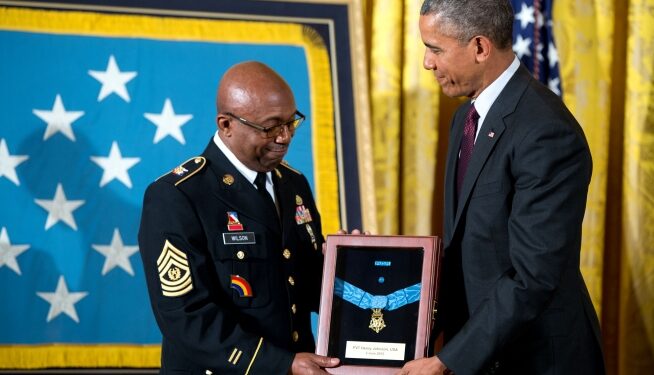April 10, 2025 Story by: Editor
Sgt. Maj. Lewis Wilson, a seasoned member of the New York Army National Guard, has dedicated nearly four decades to military and public service. A retired police officer from Rochester, New York, Wilson has held top noncommissioned officer (NCO) positions at every level—from section to general officer command. Since 2014, he has served as the Command Sergeant Major of the New York National Guard.
His service includes a deployment to Kuwait and Iraq in 2004–2005 as a brigade command sergeant major, and he has also responded to numerous state emergencies, including floods, snowstorms, and the 9/11 terrorist attack in 2001.
On June 2, Wilson will represent a World War I hero when he accepts the Medal of Honor on behalf of Sgt. Henry Johnson, an African-American soldier from the New York Army National Guard who was posthumously awarded the nation’s highest military honor. Since Johnson died in 1929 without any living relatives, Wilson will accept the medal from President Barack Obama at the White House.
“It’s an incredible honor,” Wilson said.
“I am excited, happy, that I am the person selected for this to represent the Soldiers and especially the enlisted corps for this. To receive this honor on his behalf from the president,” Wilson said.
Maj. Gen. Patrick Murphy, the adjutant general of New York, explained that Wilson was the right person for this moment because Sgt. Johnson was an enlisted soldier in the New York National Guard and Wilson, as the senior enlisted leader, represents all enlisted members.
Sgt. Henry Johnson’s story is one of remarkable bravery and delayed recognition. At 20, Johnson worked as a baggage handler in Albany and enlisted in Company C of the 15th Regiment of the New York National Guard—an all-Black unit formed in Harlem in 1913. When the U.S. entered World War I in 1917, the regiment was renamed the 369th Infantry Regiment and deployed to France.
Due to racial bias, Black soldiers were initially given support roles by the U.S. Army. However, the French Army, needing reinforcements, welcomed the 369th to the front lines. Johnson and his unit traded their American gear for French weapons and joined the trenches.
On the night of May 14, 1918, Johnson and fellow soldier Pvt. Needham Roberts were attacked by a German raiding party of about 24 men. Despite being outnumbered and with Roberts wounded, Johnson fought fiercely using his rifle, knife, and fists, reportedly killing at least four German soldiers and wounding others.
His valor earned him France’s prestigious Croix de Guerre with a palm, but the U.S. Army did not honor him at the time. Former President Theodore Roosevelt, however, recognized his bravery, calling him “one of the five bravest American Soldiers of the war.”
Johnson returned home a hero in the press, but was soon forgotten. It wasn’t until the 1990s that a campaign began to revisit his military record. In 2003, he was posthumously awarded the Distinguished Service Cross. Continued efforts ultimately led to the decision to bestow the Medal of Honor.
For Wilson, representing Johnson at the White House is deeply personal.
“With Sgt. Johnson I can equate that he was a New York National Guard Soldier and, in a way, I am his command sergeant major,” Wilson said. “I have been thinking about that a lot lately.”
Wilson, like Johnson, is African-American and a member of the National Guard. He sees their shared experience as symbolic of the progress made over the last century.
“But unlike his day in which he was never recognized, today we are recognized,” Wilson said. “He paved the way for African-American Soldiers.”
“Where they served in segregated units, today we fight side-by-side as a team,” he added.
Both men also left their hometowns—Johnson from Albany, and Wilson from Rochester—to serve their country. Wilson’s long career has taken him across New York State, echoing Johnson’s own journey of service and sacrifice.
“In his attitude of wanting to serve his country, it feels the same way I do because I wanted to serve,” Wilson added.
Although Wilson hadn’t thought much about Johnson while growing up in Rochester, that changed when he moved to Albany for his role as Command Sergeant Major. In Albany, Johnson’s legacy is ever-present—from Henry Johnson Boulevard to schools and statues bearing his name.
“People talk about him all the time,” Wilson said.
Learning more about Johnson has made the honor of standing in for him even more powerful.
One particular image of Johnson stands out to Wilson. It’s a photo taken after the war in 1919, showing Johnson proudly smiling in uniform, adorned with his medals.
“I wonder how he felt at that time,” Wilson said. “He went through a horrific fight, for the life of himself and his battle buddy and to see him afterward wearing those medals, I wonder how he felt. It gives me a sense of wonder. It makes me say wow.”
Source: National Guard
















